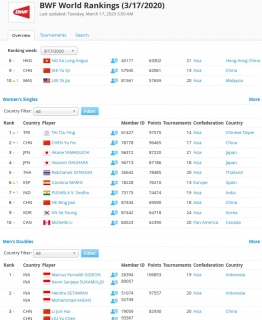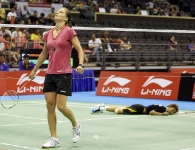The Badminton World Federation (BWF) announced yesterday that it would be freezing the world rankings at their March 17th state, with no updates until after international tournaments can resume when the Covid-19 pandemic subsides.
In a press release Tuesday, the BWF announced that the badminton world rankings will remain frozen in their state following the 2020 All England, the last international badminton tournament before the entire tour had to be suspended, indefinitely, on account of the Covid-19 pandemic. At present, the tour suspension is officially only until the end of April but the press release all but announces that May and June are also off. Already, the biggest tournaments scheduled for May (the Thomas and Uber Cups) and July (the Tokyo Olympics) have been postponed and with the pandemic worsening by the day, there is really no end in sight for the tournament suspension.
However, once tournament play can safely resume, players will be able to enter the earliest events based on their March 17th, 2020 rankings. The BWF points out that it will require further deliberations to determine how best to ‘unfreeze’ the rankings once new points get added on. The world body hopes to do so “in a staggered way to avoid any extreme drop off of points from previous tournaments causing an extreme impact on the ranking structure.“
Also yet to be decided is how to deal with qualification for the now-postponed Tokyo Olympic Games. At the conclusion of the All England, there were 5 weeks of major tournaments that all had to be cancelled. However, as it had a definite starting point, there was no question of those rankings needing to be frozen. Instead, the BWF may decide to include two more months of qualifying when the tour resumes.
The press release points out that it is as yet impossible to determine when the suspended tournaments could possibly be rescheduled. The September-December schedule is always notoriously cramped as it is, with 12 weeks in a 15-week period occupied by events at Super 300 level and above. Any decisions about whether to bump the existing autumn events out to make room for those cancelled in the spring will clearly have to wait until after the pandemic begins to come under control.
The biggest events that had to be suspended from the original Tokyo qualifying period were the Malaysia Open Super 750, the Singapore and India Opens (Super 500), the German and Swiss Opens (Super 300), and the continental championships for Pan Am, Asia, and Europe.
![BWF freezes world rankings at March 17th The Badminton World Federation (BWF) announced yesterday that it would be freezing the world rankings at their March 17th state, with no updates until after international tournaments can resume when […]](http://www.badzine.net/wp-content/uploads/ngg_featured/Frozen-BWF-Rankings_rotator.jpg)









Leave a Reply